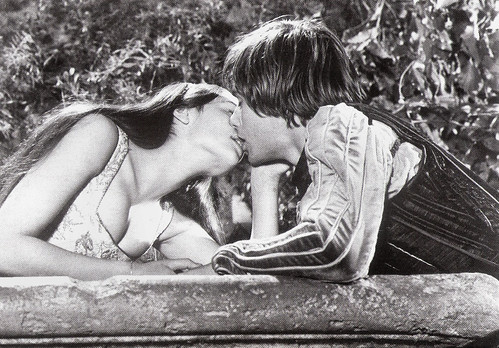
West German postcard by Palast. Photo: picture-alliance / KPA. Leonard Whiting and Olivia Hussey in Romeo and Juliet (Franco Zeffirelli, 1968).
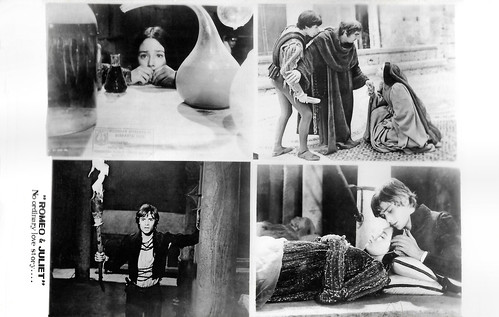
Vintage card. Olivia Hussey and Leonard Whiting in Romeo and Juliet (Franco Zeffirelli, 1968). Caption: No ordinary love story....

Indonesian postcard. Olivia Hussey in Romeo and Juliet (Franco Zeffirelli, 1968). Caption: No ordinary love story....
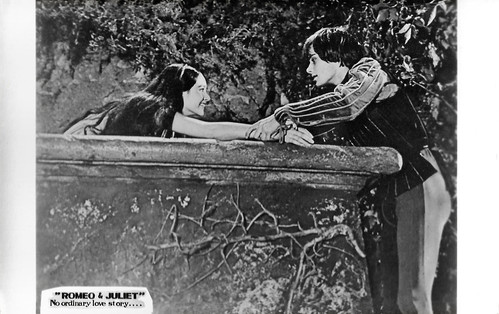
Vintage card. Olivia Hussey and Leonard Whiting in Romeo and Juliet (Franco Zeffirelli, 1968). Caption: No ordinary love story....
A Forbidden Romance in Verona
Romeo and Juliet is set in 14th-century Renaissance Italy. One summer morning in Verona, a longstanding feud between the Montague and the Capulet clans breaks out in a street brawl. The brawl is broken up by the Prince, who warns both families that any future violence between them will result in harsh consequences. That night, two teenagers of the two families—Romeo and Juliet—meet at a Capulet masked ball and fall in love. Later, Romeo stumbles into the secluded garden under Juliet's bedroom balcony and the two exchange impassioned pledges. They are secretly married the next day by Romeo's confessor and father figure, Friar Laurence, with the assistance of Juliet's nurse.
That afternoon, Juliet's cousin Tybalt, furious that Romeo had attended his family's ball, insults him and challenges him to a brawl. Romeo now regards Tybalt as family and he refuses to fight him, which leads Romeo's best friend, Mercutio, to fight Tybalt instead. Despite Romeo's efforts to stop the fight, Tybalt mortally wounds Mercutio, who curses both the Montague and Capulet houses before dying. Enraged over his friend's death, Romeo retaliates by fighting Tybalt and killing him. Romeo is subsequently punished by the Prince with banishment from Verona, with the threat of death if he ever returns. Romeo then secretly spends his wedding night with Juliet, the couple consummate their marriage, and Romeo flees. Juliet's parents, unaware of their daughter's secret marriage, have arranged for Juliet to marry wealthy Count Paris. Juliet pleads with her parents to postpone the marriage, but they refuse and threaten to disown her. Juliet seeks out Friar Laurence for help, hoping to escape her arranged marriage to Paris and remain faithful to Romeo. At Friar Laurence's behest, she reconciles with her parents and agrees to their wishes.
On the night before the wedding, Juliet consumes a potion prepared by Friar Laurence intended to make her appear dead for 42 hours. Friar Laurence plans to inform Romeo of the hoax so that Romeo can meet Juliet after her burial and escape with her when she recovers from her swoon, so he sends Friar John to give Romeo a letter describing the plan. However, when Balthasar, Romeo's servant, sees Juliet being buried under the impression that she is dead, he goes to tell Romeo and reaches him before Friar John. In despair, Romeo goes to Juliet's tomb and kills himself by drinking poison. Soon afterwards, Friar Laurence arrives as Juliet awakens. Despite his attempts to persuade her to flee from the crypt, Juliet refuses to leave Romeo, and once the Friar flees, she kills herself by plunging his dagger into her chest. Later, the two families, having ended their feud, attend their joint funeral and are condemned by the Prince.
Romeo and Juliet has been filmed many times in many ways. In 1967, Franco Zeffirelli engaged in a worldwide search for unknown teenage actors to play the parts of the two lovers. Anjelica Huston was in the running for Juliet, but her father, the director John Huston, withdrew her from consideration when he decided to cast her in his film A Walk with Love and Death. Leonard Whiting was 16 and Olivia Hussey was 15 during casting, but were 17 and 16 when filming began in the summer of 1967. Zeffirelli adapted the play in such a way as to play to their strengths and hide their weaknesses: for instance, long speeches were trimmed, and he emphasized reaction shots. Romeo e Giulietta/Romeo and Juliet (Franco Zeffirelli, 1968) was nominated for the Academy Award Best Director and Best Picture. It was the last Shakespearean film to date to be nominated for the latter category. Leonard Whiting and Olivia Hussey both won Golden Globe Awards for Most Promising Newcomers.
Roger Ebert of the Chicago Sun-Times wrote about the film: "I believe Franco Zeffirelli's Romeo and Juliet is the most exciting film of Shakespeare ever made." Dan Jardine at AllMovie: "The unrepentant romanticism of Franco Zeffirelli's Romeo and Juliet works beautifully in translating William Shakespeare's tragic drama to the silver screen. The lyrical score of Academy Award-winner Nino Rota (The Godfather) and the voluptuous and magnificent period costumes by Danilo Donati combine with the sensuous and dusty cinematography of Pasqualino De Santis to evoke the Italian Renaissance setting perfectly. Ever the traditionalist, Zefferelli took a consistently conventional approach to the production, with his only really daring move coming in the casting. For the first time in film, two teenage actors portray Shakespeare's tragic protagonists, and the employment of a cast rife with unknowns results in the film being a triumph of spirit and enthusiasm over technique."

Italian postcard. Olivia Hussey in Romeo and Juliet (Franco Zeffirelli, 1968).
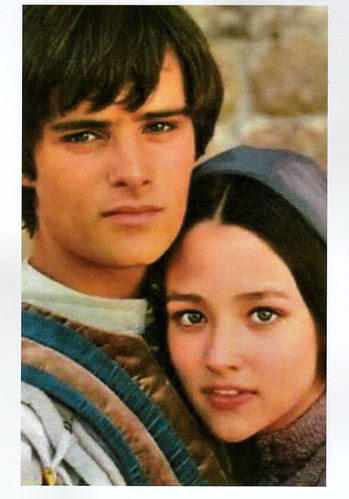
Italian postcard. Leonard Whiting and Olivia Hussey in Romeo and Juliet (Franco Zeffirelli, 1968).
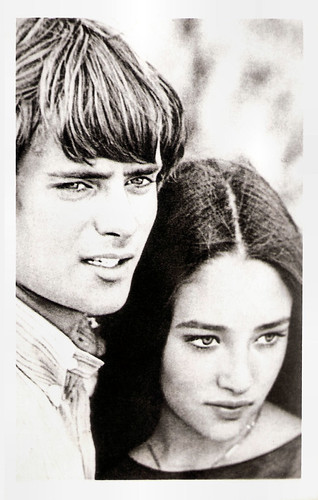
Vintage card, sent by mail in 1976. Leonard Whiting and Olivia Hussey.
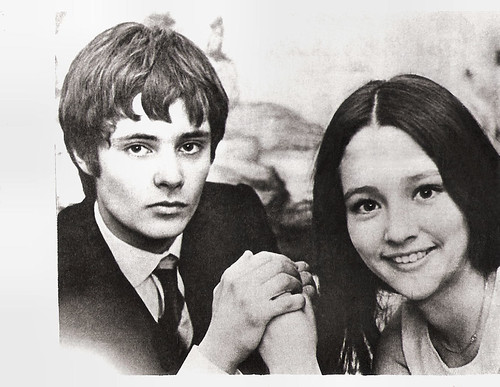
Vintage card. Olivia Hussey and Leonard Whiting.

Italian promocard by Palazzo Piccolomini, Pienza, 2018. This card was published to promote the celebrations for the 50th anniversary of the release of Romeo and Juliet (Franco Zeffirelli, 1968) starring Olivia Hussey and Leonard Whiting.
Sources: Roger Ebert (Roger Ebert.com), Hal Erickson (AllMovie), Dan Jardine (AllMovie), Wikipedia and IMDb.
No comments:
Post a Comment